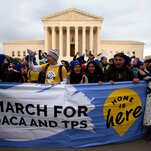He said the decision also made it clear that the government had discretion to determine when it was safe for immigrants given temporary protections to return home. For countries such as
The court’s ruling could force many people who have been in the country for years, if not decades, to contemplate leaving their jobs, homes and communities to return to impoverished countries that are ill-prepared to absorb them. It also could result in the separation of families because beneficiaries have about 200,000 U.S.-born children.
Ten countries are currently part of the temporary protected status program, signed into law by President George H.W. Bush in 1990. Only four were officially included in Monday’s decision — El Salvador, Haiti, Nicaragua and Sudan — but nationals from two other countries, Honduras and Nepal, sued separately and a legal agreement calls for those countries to be covered by Monday’s decision.
Nationals of El Salvador, the first to be offered temporary protected status, as a result of the country’s civil war in the 1980s, represent about half of all recipients. Haitians received protection after the 2010 earthquake. Syria and Yemen were designated after civil wars erupted there.
Under the program, the secretary of homeland security decides when a country merits the designation and the status can be extended indefinitely. Bosnia and Herzegovina lost its temporary protected status after the end of its 1990s-era civil war, as did Guinea, Sierra Leone and Liberia after the Ebola crisis.

Determined to reduce immigration, President Trump in 2017 began trying to scrap protection under the program for several other countries, meeting with lawsuits that temporarily blocked any cancellations.
The government extended protections under the program for beneficiaries from El Salvador, Haiti, Honduras, Nepal, Nicaragua and Sudan, who account for more than 90 percent of the total, as the courts considered the legal challenges.





